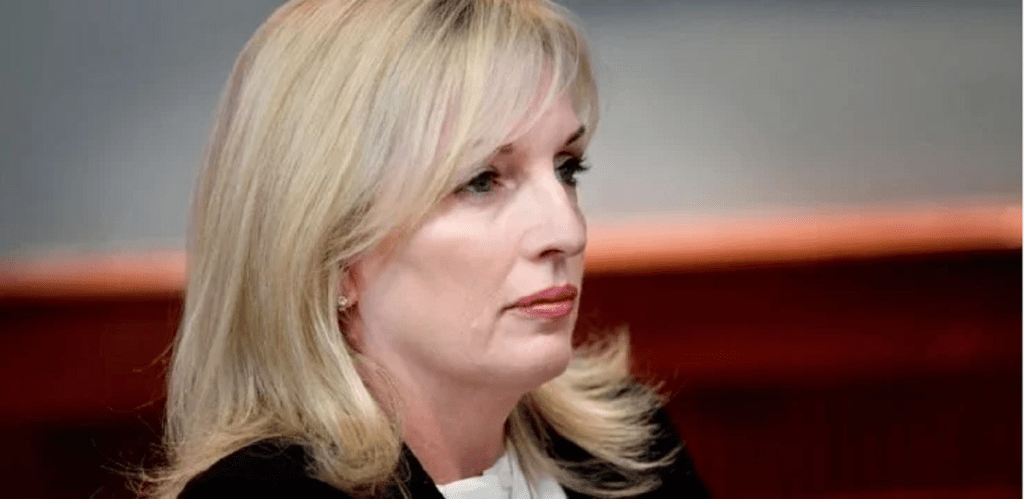In honour of the fact that this week Taylor Swift will grace our shores to start her concert tour, and of course today is the Superbowl which Taylor Swift is famously attending, allow me a few observations I’ve made of late.
I wrote last week about Taylor Swift winning her historic fourth Album of the Year Grammy, only to have the press pull apart all the ways in which she didn’t perfectly accept the award — Slate wrote she was too ‘self-effacing’ — in that it was a strategy to endear her to the public rather than an authentic response, or she was too ‘strategic’ in the way she spoke as though it was too calculated and not spontaneous enough. That she didn’t give enough deference to Celine Dion when being presented her award and that she was crass because she used the occasion to announce her eleventh album was on its way.
Not everyone thought all these things, but far out, man. Imagine being — objectively, according to the Grammy’s — the most highly decorated (because Album of the Year is considered the greatest accolade) singer-songwriter-artist of the last few generations, only to be picked apart on precisely every possible tiny misstep she made in the space of 75 seconds (the amount of time she had to accept the award)? 75 seconds.
This is after months of relentless commentary about whether she was using her attendance at her boyfriend’s football game as a PR scheme, whether she attended them too much, whether she was being shown too much by the broadcasters when she did attend, not to mention the daft conspiracy theories about whether her relationship is actually some government psychological operation to influence the election.
Which itself was off the back of years of relentless criticism by the press for being stupid, for dating too many men, that she couldn’t hold on to a man, that she was petty for turning her real life events into song lyrics, and so many more she turned it into a song Shake it off.
“I go on too many dates, cause I cant make them stay, that’s what people say. I stay up too late, got nothing in my brain, that’s what people say.”
And lastly, she was effectively shunned after the accusation by Kanye West that she had lied about approving his song lyrics “I feel like me and Taylor might still have sex, why? I made that bitch famous” by providing recorded ‘proof’ of her consent after asking her if “it was cool?”.
Later on, that was revealed to be based on doctored recording. Her song Look What You Made Me Do on the album Reputation, references this false consent:
“I don’t like your perfect crime. How you laugh when you lie. You said the gun was mine. Is it cool? No, I don’t like you (oh!)”
The vanishing woman
In response to the backlash, Swift disappeared from sight, renting a house in Europe where no one could find her for two years. She thought the world hated her and was sick of her. This is something Margot Robbie is doing right now, pre-emptively. She recently admitted she was taking time away from film making for a while out of fear that, after the enormous success of Barbie, ”everybody are probably sick of me”.
The relentless standards of perfection that successful or powerful women are held to, to be considered deserving is something to behold. But women must also be on constant surveillance of the limits of society’s tolerance for them, and then strategically never meet that limit to avoid ‘cancellation’. It seems we just can’t quite let some women deserve or enjoy their success or power, unless they are absolutely, 100 percent, unimpeachably, perfect, yet also, aware and humble enough to stay out of view and know her place, when she is.
While it would be easy to write this off as ‘champagne problems’, as the Barbie movie highlighted, this is a systemic issue for all women. If Taylor Swift or Margot Robbie as white women of immense privilege are vulnerable to it, imagine the challenges for other groups of women.
Double standards
These are standards that men simply are not held to.
I don’t recall Harry Styles being criticised in any way for any missteps he made when accepting the Album of the Year award last year at the Grammys. I don’t see any famous male spectator who regularly attend sports games ever criticised for attending too many games, or accused of it being a play for PR or being shown too much by the broadcast.
In fact, Ryan Reynolds literally bought a sports team then made a documentary about buying a sportsts team and he doesn’t get criticised for doing it for PR. I don’t see other male actor, say George Clooney or Brad Pitt, ever saying they need to step out of the public eye lest the public turn on them for saturating the cultural consciousness.
The former President of the United States was elected to be the President of the United States – the highest office in public service and one of the most powerful positions in the world – despite numerous allegations of wrongdoing, including an infamous recording of his admission on how he assaults women.
Closer to home, this past week we saw our video footage of former Deputy Prime Minister Barnaby Joyce, still a member of parliament, sprawled on a street, drunk, yelling expletives into his phone. There was criticism of his actions but there was also substantial grace afforded to him and concern aired that he needed medical treatment. You may recall, however when the Finish Prime Minister Sanna Marin, a woman, had a small house party where she had a couple drinks and danced and it was posted to social media. She was forced to apologise publicly to the world.
The silent woman
Nor can we give successful women permission for the voice or feelings they express publicly. Taylor Swift wrote in Dear John (yes, the song she wrote about John Mayer):
“You are an expert at sorry and keeping the lines blurry. Never impressed by me acing your tests. All the girls that you’ve run dry have tired lifeless eyes ’Cause you burned them out”
Mayer later said publicly how he was humiliated by the song “Because I didn’t deserve it. I’m pretty good at taking accountability now, and I never did anything to deserve that. It was a really lousy thing for her to do.” Despite Mayer (and every other songwriter in the history of the world) using his own life as fodder for his songs (and rumoured to have written his song Paper Doll about Swift), he has never been criticised for it.
Swift has subsequently said in an interview when talking about Folklore several years later:
“The most rage provoking element of being a female is the gaslighting that happens when, for centuries, we’ve been just expected to absorb male behaviour silently. Right? Silent absorption of whatever any guy decides to do. And often times when we, in our enlightened state, in our emboldened state now, respond to bad male behaviour or somebody just doing something that was absolutely out of line and we respond, that response is treated like the offence itself.
There’s been situations recently, somebody who’s very guilty of this in my life, it’s a person who makes me feel- or tries to make me feel- like I’m the offender by having any kind of defence to his offences. It’s like, oh, I have absolutely no right to respond or I’m crazy. I have no right to respond or I’m angry. I have no right to respond or I’m out of line.”
Society struggles to show a woman they are “impressed when she aces their tests”, so we react by picking apart any slight imperfection. Moreover, a woman better not have a reaction to male behaviour, or a public or private expression of her own feelings, or she will be treated as the offender — she will be accused of going about it the wrong way, being humiliating, being petty or spiteful, having a victim mentality, having an illegitimate motive, or just plain wrong.
Double standards for women in every industry
In the corporate realm, if a woman is not perfect or has opinions or feelings then she is accused of being ‘unprofessional’ or hurting the interests of the men around her. It will be coded as what’s in the best interests “of the company” but it will actually be about men’s feelings and reputations.
When Christine Holgate, the former CEO of Australia Post, was put on blast by the press, the Prime Minister and many others for gifting her staff some watches as a bonus for their good performance, it eventually resulted in her stepping down. However, she was an extremely effective CEO, and had turned around the performance of Australia Post.
Compared to those which she succeeded and those that succeeded her, Holgate outperformed and was paid less. Her base salary of $1.375 million was much lower than her predecessor, Ahmed Fahour, who pocketed $5.6 million in a year. Fahour left with a $10 million golden handshake. Nevertheless, when she and her Board made a calculated decision to reward the staff for some landmark agreements they executed, she and the Board chose not to give her staff $150,000 bonuses they were authorised to do and gifted them a $5000 watch instead. The Prime Minister at the time, used it as a political point scoring exercise, demanding in parliament that she step aside for awarding her staff such an egregious gift.
Eventually she would be forced to step aside for the “good of Australia Post”. Her successor went on to actually award eight senior executives collectively $4.45m in bonuses with another $24m in incentives paid to 362 non-executive staff, who already earned more than $235,000. And there was no controversy whatsoever. The moral of the story is, despite her success in her role, despite history subsequently showing her not to have made a mistake afterall, she was held to higher standards and the perception that was not utterly perfect, was her downfall.

Grace Tame, as Australian of the Year, was a force to be reckoned with in highlighting the plight of victims of child sexual abuse. She categorically refused to be silent about her opinions and feelings, or to play nice simply to placate the people around her, and for that she was relentlessly criticised.
Despite being an extremely effective Australian Of The Year, promoting awareness and legislative change for the victims of child sexual abuse, she was accused of being a ‘brat’, ‘disrespectful’ and unprofessional for refusing to smile in photos, for example. She was accused of not having sufficient deference for those who bestowed the award on her , or undermining the then Prime Minister Scott Morrison as though she was using her position to make a political statement….sounding familiar? (But also, so what if she was?). Grace Tame received far more criticism for simply not smiling than Scott Morrison ever did for secretly assuming 8 portfolios.

Over the years, when I’ve dared to have opinions, express my feelings or not tolerate poor male behaviour in the workplace, I’ve been called stupid, or crazy (the classic insults if you want to undermine a woman) or psychologically damaged, and made out to be the offender as a result. All these accusations, comments and feedback, were always from men.
This is not about not taking on board constructive feedback which we should all do. It’s also not saying women can’t be called out when they behave badly themselves. This is about how intolerant we are of women refusing to absorb male behaviour that they believe is out of line, or to stand up for themselves and how we try to coerce women to silence by making them out to be the offenders when they do. It’s also about how when women are successful, or they gain any power, we will still reserve the right punish them or dismiss them for the slightest missteps that simply don’t apply to men.
Are we really saying for women to enjoy their power or success or to not be relentlessly criticised, they should be perfect, and if not perfect, then neither seen, nor heard?
I’ll leave you with a lyric from The Man, a song from Swifts album Lover which I think is apt for this article:
“I’m so sick of running as fast as I can. Wondering if I’d get there quicker If I was a man. And I’m so sick of them coming at me again. ’Cause if I was a man. Then I’d be the man. I’d be the man, I’d be the man.
They’d say I hustled. Put in the work. They wouldn’t shake their heads and question how much of this I deserve. What I was wearing. If I was rude. Could all be separated from my good ideas and power moves?”


